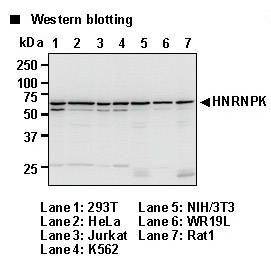Anti-HNRNPK (Human) pAb
Product Code:
MBL-RN019P
MBL-RN019P
Host Type:
Rabbit
Rabbit
Antibody Isotype:
Affinity Purified Ig
Affinity Purified Ig
Antibody Clonality:
Polyclonal
Polyclonal
Regulatory Status:
RUO
RUO
Target Species:
- Human
- Mouse
- Rat
Applications:
- Immunoprecipitation (IP)
- RIP
- Western Blot (WB)
Shipping:
4°C
4°C
Storage:
-20°C
-20°C
No additional charges, what you see is what you pay! *
| Code | Size | Price |
|---|
| MBL-RN019P | 200 ul | £502.00 |
Quantity:
Prices exclude any Taxes / VAT








